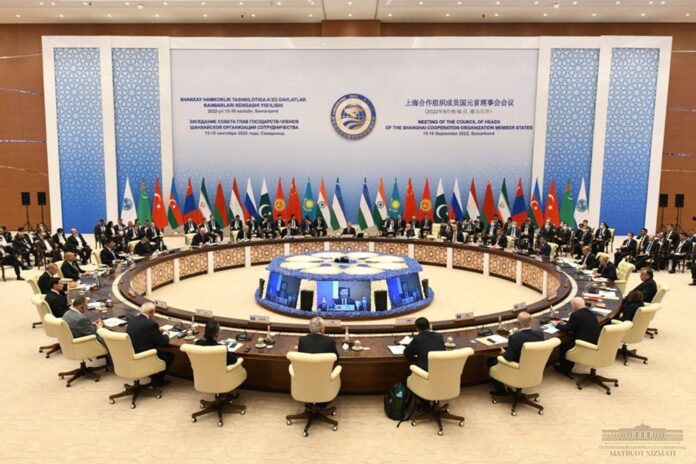The resolution passed by the SCO meeting alluded to the international challenges and threats that are becoming more complex and leading the world to a situation where local conflicts are intensifying and new ones are emerging. SCO resolution also called for a “more representative, democratic, just and multipolar world order.”
On 15 and 16 September 2022, a meeting of the Council of Heads of State of Shanghai Cooperation Organization (SCO) was held in Samarkand that was attended by the delegates from seven member countries: China, Russia, Kazakhstan, Kyrgyzstan, Tajikistan, India and Pakistan. The meeting gained prominence in global media because it was held at a time when the majority of the members faced crises that were against the basic agenda of the meeting which calls for good-neighborliness, friendship and cooperation among the SCO Member States in developing connectivity and enhancing efficient economic and mutual trade relationships by gradually increasing the share of national currencies for the purpose.
Two global issues, Ukraine War and China’s claim over Taiwan, dominated the summit – both direct in and on the sidelines of the SCO meeting. The world press defined it as an attempt of Russia and China to rally Asian leaders behind a new “world order” that can challenge the Western influence. The resolution passed by the SCO meeting also alluded to the international challenges and threats that are becoming more complex and leading the world to a situation where local conflicts are intensifying and new ones are emerging.
The idea of “new world order” is not new as it has been intermittently been part of the international political discourse since the disintegration of the former Soviet Union that heralded a new cold war era led by the United States.
One of the points of the resolution passed at the conclusion on 16 September 2022 relates to non-interference in internal affairs of independent nations.
“Member States note the inadmissibility of interference in the internal affairs of States under the pretext of countering terrorism and extremism, as well as the inadmissibility of the use of terrorist, extremist and radical groups for selfish ends,” the resolution said.
There are at least seven resolutions that define terrorism as a threat to the security of the member countries. Although Afghanistan, a member of the summit as an observer, was not invited to the meeting because some member states had objected to it, yet it remained under focus because China, Central Asian Republics, Russia and Pakistan claim that terrorist organizations like Al-Qaeda, Tehreek-e-Taliban Pakistan, Jaish-e-Mohammadi, and ISIL-K, IMU, ETIM and Islamic Jihad are all operating out of Afghanistan.
Coincidentally, two members of the summit, Pakistan and India, blamed each other for interreference in each other’s affairs using their proxies. Simultaneously, the resolution demanding good-friendly and mutual trade relationships doesn’t speak very well for these two countries as no such relationship exists between them. Even the recent climatic disaster in Pakistan that inundated a huge piece of agricultural land, damaged properties, rendered millions of people homeless, couldn’t motivate India to offer any helping hand to Pakistan while the reaction from Pakistan was no different either as a sense of pride prevailed in the country for not seeking any help from its neighboring enemy.
SCO summit also called for a “more representative, democratic, just and multipolar world order”. It’s an objective that has a universal appeal and agreement as most of the conflicts endangering world peace are results of non-adherence to this basic principle of co-existence. Why do the countries tend to defy this great rule? The only answer is; how each country interprets this rule. For the Western powers, the acts of terrorism and extremism are good reasons for their interference in the internal affairs of other States while Russia uses hate crimes against Russian speaking citizens of Ukraine as a justification for its war against Ukraine.
These are the issues that are at variance with the goals set by resolutions passed by SCO at various meetings۔
With new economic powers emerging on the global economic horizon, new desires and ambitions are also bound to make their appearances seeking accommodation in the global political networks. SCO is an exhibition of this trend. To evade any chances of failures as experienced by other similar drives in the past, the member countries of SCO have to jointly work diligently. Leading by example can truly reflect their sincerity to the cause they have set for the achievement of their goals.
Though it seems to be an unachievable idea under the existing world order system, the strive for a change doesn’t seem to be too elusive. However, to rally other countries to this great ideal would be too difficult if the member countries fail to follow the goals set by the SCO itself.




